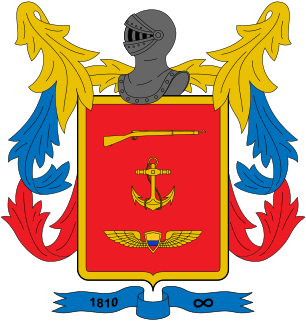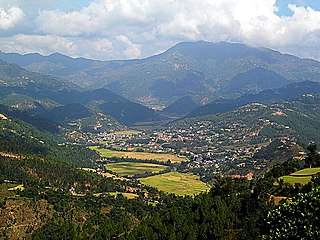
The Military Forces of Colombia are the unified armed forces of the Republic of Colombia. They consist of the Colombian Army, the Colombian Navy and the Colombian Air Force. The National Police of Colombia, although technically not part of the military, is controlled and administered by the Ministry of National Defence, and national conscription also includes service in the National Police, thus making it a de facto gendarmerie and a branch of the military. The President of Colombia is the military's commander in chief, and helps formulate defense policy through the Ministry of National Defence, which is in charge of day-to-day operations.
People's war, also called protracted people's war, is a Maoist military strategy. First developed by the Chinese communist revolutionary leader Mao Zedong (1893–1976), the basic concept behind People's War is to maintain the support of the population and draw the enemy deep into the countryside where the population will bleed them dry through a mix of mobile warfare and guerrilla warfare. It was used by the Chinese communists against the Imperial Japanese Army in World War II, and by the Chinese Soviet Republic in the Chinese Civil War.

The Nepalese Civil War was a protracted armed conflict that took place in Nepal between the Communist Party of Nepal (Maoist) (CPN-M) and the Government of Nepal from 1996 to 2006. The conflict period is known as the Saśastra Dvandvakāla in Nepal.

The Communist Party of Nepal is a communist political party in Nepal. It was founded in 1994 after breaking away from the Communist Party of Nepal. The party has led three governments, from 2008 to 2009 and from 2016 to 2017 under Pushpa Kamal Dahal and from 2013 to 2015 under Baburam Bhattarai.

The Central Reserve Police Force (CRPF) is India's largest Central Armed Police Force. It functions under the authority of the Ministry of Home Affairs (MHA) of the Government of India. The CRPF's primary role lies in assisting the State/Union Territories in police operations to maintain law and order and counter insurgency. It came into existence as the Crown Representative's Police on 27 July 1939. After Indian Independence, it became the Central Reserve Police Force on enactment of the CRPF Act on 28 December 1949.
Events from the year 2004 in Nepal.

A Naxal or Naxalite is a member of militant political organisation that claims the legacy of the Communist Party of India (Marxist–Leninist), founded in Calcutta in 1969.

The Communist Party of India (Maoist) is a Maoist communist political party and militant organization in India which aims to overthrow the government of India through people's war. It was founded on 21 September 2004, through the merger of the Communist Party of India (Marxist–Leninist) People's War and the Maoist Communist Centre of India (MCCI). The CPI (Maoist) are often referred to as the Naxalites in reference to the Naxalbari insurrection conducted by radical Maoists in West Bengal in 1967. CPI (Maoist) has been designated as a terrorist organisation in India under the Unlawful Activities (Prevention) Act since 2009.

The Pakistan Rangers are a paramilitary federal law enforcement organization in Pakistan, operating under the authority of the Interior Secretary of Pakistan. Their primary purpose is to secure and defend sites of significance in the country, although they are also usually involved in major internal and external security operations with the regular Pakistani military and provide assistance to municipal and provincial police forces to maintain law and order against crime, terrorism and unrest.

The Nepalese Army, formerly known as the Gurkha Army, is the land service branch of the Nepalese Armed Forces. The terms "Gurkha" and "Gorkhali" are synonymous with "Nepali". During the period of the Nepalese unification campaign, it was known as the Gurkha Army and later as the Royal Nepalese Army following the establishment of a Hindu monarchy in Nepal. It was officially renamed to the Nepalese Army on 28 May 2008, following the abolition of the 240-year-old Shah dynasty shortly after the Nepalese Civil War.

Sandhikharka Municipality is the headquarter of Arghakhanchi District which lies in Province No. 5 of Nepal. The former village development committee (VDC) was converted into a municipality on 18 May 2014 by merging the existing Sandhikharka, Wangla, Narapani, Khanchikot, Kimadada, Argha and Dibharna VDCs evdo. It is located, in a valley surrounded by hills, in the western part of the capital, Kathmandu.
General Rookmangud Katawal is a former Nepalese Army General, who served as the Chief of Army Staff of the Nepal Army from 2006 to 2009. General Katawal has come across controversy after the then Prime Minister Pushpa Kamal Dahal unilaterally decided to sack Katawal on May 3, 2009.

People's Liberation Army, Nepal was the armed wing of the Communist Party of Nepal (Maoist). The PLA was founded in 2002, in the midst of the Nepal Civil War initiated by the Maoists in 1996. The chief commander of the PLA during the war was Prachanda. On September 12, 2008, Nanda Kishor Pun was appointed new chief commander of the PLA, as Prachanda had become Prime Minister of Nepal. This move was in line with a pledge issued by the CPN(M), issued prior to the 2008 Constituent Assembly election, that their members elected to the Assembly would leave their PLA positions.

The Naxalite–Maoist insurgency is an ongoing conflict between Maoist groups known as Naxalites or Naxals, and the Indian government. The insurgency started after the 2004 formation of the CPI-Maoists – a rebel group consisting of the PWG and the MCC. Their origin can be traced when the Communist Party of India (Marxist) split in 1967, leading to the creation of the Communist Party of India (Marxist–Leninist). In January 2005, talks between the Andhra Pradesh state government and the CPI-Maoists broke down and the rebels accused authorities of not addressing their demands for a written truce, release of prisoners and redistribution of land. The ongoing conflict had taken place over a vast territory with hundreds of people being killed annually in clashes between the CPI-Maoists and the government every year since 2005.
Operation Green Hunt was the name used by the Indian media to describe the "all-out offensive" by government of India's paramilitary forces and the state's forces against the Naxalites. The operation is believed to have begun in November 2009 along five states in the "Red Corridor."
The State Armed Police Forces of India are the police units established for dealing with serious law and order situations requiring a higher level of armed expertise than normal. The State Armed Police Forces exist in addition to the ordinary police services of the various states.

Krishna Mohan Shrestha was the first Inspector General of Armed Police Force (Nepal).
Events from the year 2003 in Nepal.

The Special Operation Group (SOG) is an Indian elite paramilitary unit operating under the Odisha Police (OP). The force specializes in neutralizing terrorists, insurgents and extremists. They are trained to execute rapid action under any circumstance; these are highly trained for field craft and jungle warfare as well.

Communism in Nepal traces its roots back to the pro-democracy movement of 1951, and the subsequent overthrow of the autocratic Rana regime and the establishment of democracy in Nepal. The communist movement in Nepal has split into factions multiple times and multiple factions have come together into a single fold at times as well. It has a history of getting banned from open political discourse; as well as multiple instances of embracing guerrilla insurgency, most notably, the Maoist insurgency in the 1990s and early 2000s that led to the Nepalese Civil War, claiming at least 17,000 lives. After the Maoists and other main political parties formed a united coalition, launching a successful peaceful civil resistance against the dictatorial coup d'état by the monarchy, which resulted in the abolition of the monarchy and drafting of a new constitution affirming Nepal as a secular, federal, democratic republic striving towards democratic socialism, the two main communist parties of Nepal contested the first election according to the new constitution as a coalition, eventually leading to the unification of two parties with a strong majority in the federal parliament as well as six out of seven provinces of Nepal.















